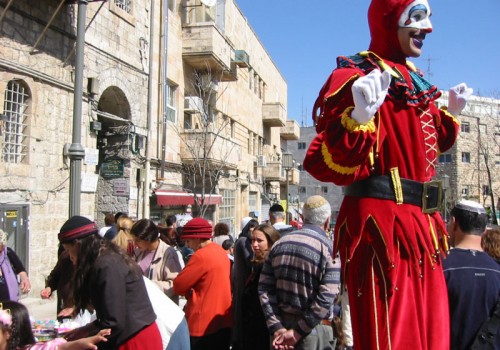Back in my California days, I don’t recall hearing much about the Jewish holiday called Purim. Everyone knew about Passover and Hanukah, and our churches usually filled us in on the spiritual significance of Jewish High Holy days including Rosh Hashanah and Yom Kippur.
But Purim? Not so much.
But during my early years in Israel, I quickly learned to appreciate this springtime celebration – at least superficially. At first glance, it was comic relief. I looked at it as sort of a religiously sanitized version of Halloween – festive, but without creepy ghouls, ugly black-and-orange trimmings and vaguely demonic masquerades.
Purim festivities in Israel include pretty little girls in gossamer dresses, tiaras and other sparkling attire – all of them easily identified as depicting Queen Esther, the heroine of the Purim story.
Incongruously, pint-sized and rowdy Batmen, Supermen, Spidermen and occasional soccer heroes accompany their more demure counterparts to and from school and elsewhere.
Meanwhile, cookies called Hamantaschen appear in markets, bakeries and sidewalk sales. These three-cornered pastries are “filled with poppy seeds (mohn in Yiddish), fruit preserves, chocolate, or other ingredients that are traditionally eaten on Purim. In Israel during the weeks leading up to Purim, the aroma of freshly baked hamantaschen can be smelled on every block. Their triangular shape is thought to be be reminiscent of Haman’s hat or ears.”
Haman, of course, was the vile anti-Semite who plays the arch-villain in the biblical account of Queen Esther.
And it is Esther’s story that Purim celebrates.
More than a children’s Bible story.
Purim, by the way, isn’t just for kids. There are grownup festivities galore, sometimes involving copious amounts of alcohol. It seems (controversially among some more piously-minded groups) that this tradition reflects a Talmudic passage in which a celebrant is obliged to drink on Purim until he does not know the difference between “cursed be Haman” and “blessed be Mordechai.”
Mordechai, the hero of the Purim story, was Queen Esther’s cousin and guardian. Mordechai and Esther were Jews – part of a Jewish diaspora in the heart of Persia – although the king initially seemed to have been unaware of their origins.
As the story unfolded, Mordechai somehow overheard Haman’s dangerous plot to murder all the Jews in the kingdom. He warned the queen about it, inspiring her to gamble with her life in order to alert King Ahasuerus of the danger.
Perhaps the most poignant passage in the book of Esther relates Mordechai’s relayed warning to Esther (recorded in chapter 4), and her courageous response:
Do not think in your heart that you will escape in the king’s palace any more than all the other Jews. For if you remain completely silent at this time, relief and deliverance will arise for the Jews from another place, but you and your father’s house will perish. Yet who knows whether you have come to the kingdom for such a time as this?
Then Esther told them to reply to Mordecai: “Go, gather all the Jews who are present in Shushan, and fast for me; neither eat nor drink for three days, night or day. My maids and I will fast likewise. And so I will go to the king, which is against the law; and if I perish, I perish!
It was unlawful – literally at risk of her life – for the queen to present herself to her husband unless he summoned her, but Esther did so anyway. Thankfully, when she told her husband about Haman’s plot, the king was infuriated. According to the story’s happy ending, King Ahasuerus honored Esther, executed Haman, promoted Mordechai to high office and rescued the the Jews.
A speech with providential timing.
This year, Purim arrived on schedule but with more serious overtones than usual. The holiday took on special significance in Israel, not least because of the astonishing timing of Prime Minister Binyamin Netanyahu’s speech to the United States Congress on March 3 – the Eve of Purim.
On that day, Netanyahu warned the American people and their president about the dangers posed by the Islamic Republic of Iran – modern day Persia –to Israel, the Middle East and the rest of the world.
In his speech, Netanyahu referred specifically to the biblical story of Esther. He explained,
We’re an ancient people. In our nearly 4,000 years of history, many have tried repeatedly to destroy the Jewish people. Tomorrow night, on the Jewish holiday of Purim, we’ll read the Book of Esther. We’ll read of a powerful Persian viceroy named Haman, who plotted to destroy the Jewish people some 2,500 years ago. But a courageous Jewish woman, Queen Esther, exposed the plot and gave for the Jewish people the right to defend themselves against their enemies.
The plot was foiled. Our people were saved.
Today the Jewish people face another attempt by yet another Persian potentate to destroy us. Iran’s Supreme Leader Ayatollah Khamenei spews the oldest hatred, the oldest hatred of anti-Semitism with the newest technology. He tweets that Israel must be annihilated – he tweets. You know, in Iran, there isn’t exactly free Internet. But he tweets in English that Israel must be destroyed.
In The American Thinker, writer Michael Curtis said,
Queen Esther was forbidden to speak to the king without being summoned. Netanyahu was not summoned by the U.S. head of state, who is unwilling to meet him, but only by the speaker of the House, John Boehner. She realized the plight of the Jewish people in Persia who were threatened by Haman’s plan for annihilation. Netanyahu recognizes the current plight of the Jewish people in Israel whose survival is endangered by the threat of annihilation from Iranian nuclear bombs.
Mordechai refused to bow down to the chief Persian politician. Netanyahu did not seek permission of the U.S. leader to speak his mind. Queen Esther managed to persuade the king to change his mind and save the Jewish people. Netanyahu is attempting to persuade the U.S. Congress to take action and save the Jewish people.
Observing “Esther’s Fast.”
Another unique aspect of the 2015 Purim events in Israel involved the one-day fast day that traditionally precedes the celebration. This recalls the three days of fasting that Esther requested of her people in preparation for her dangerous mission.
It seems to be little known outside of Christian circles – none of my Jewish friends were aware of it until I told them – that, this year, hundreds and perhaps thousands of Christians participated in the traditional “Esther’s Fast.” They did so, bringing Prime Minister Netanyahu before the Lord, seeking his protection and asking for success and blessing in his words to the world.
Christian speaker and teacher Christine Darg posted on her Jerusalem Channel-TV Facebook page, “Believers everywhere have the privilege to stand with the God of Israel by using the spiritual means of both fasting and praying to strengthen Netanyahu’s voice and the resolve of our leaders at this time. Will you fast and pray before, during or after this historic speech?”
Others more privately wrote to friends, church members and relatives on social media, suggesting the same.
So it was that both Jewish and Christian prayers ascended.
As it turned out, Netanyahu’s galvanizing speech was not only warmly received by nearly all who attended the session, but more importantly, has seemed to have had a lasting effect on policy makers and international leadership.
Extraordinarily, it was especially applauded in the Arab world, where Iran’s aggressive moves toward regional hegemony, potentially armed with nuclear weapons, are widely viewed as a grave danger.
Words of courage and celebration.
For the next two days following the speech – beyond the reach of news sites, political rhetoric and florid pre-election posts in the Israeli media – the streets of Jerusalem were beautifully ornamented with happy children costumed in a dazzling array of colors – sometimes accompanied by slightly embarrassed bewigged or masked parents.
The Mamilla Mall was adorned with hundreds of balloons in every color, not to mention signs offering “special sales,” while shoppers were serenaded by an array of buskers.
Meanwhile, the scroll of Esther – the whole megillah — was read and revered in every synagogue in town. Haman’s ears were gobbled down and his name was cursed and drowned out by noisemakers during Purim toasts.
Netanyahu concluded his speech to Congress with the emboldening words of Moses: “Be strong and resolute. Neither fear nor dread them.”
Capturing a similar sentiment, although perhaps with a little less reverence, there’s a saying in Israel that every Jewish holiday can be summed up in three sentences: “They tried to kill us. They failed. Let’s eat!”
And – after all was said and done during Purim 2015 – so they did.


